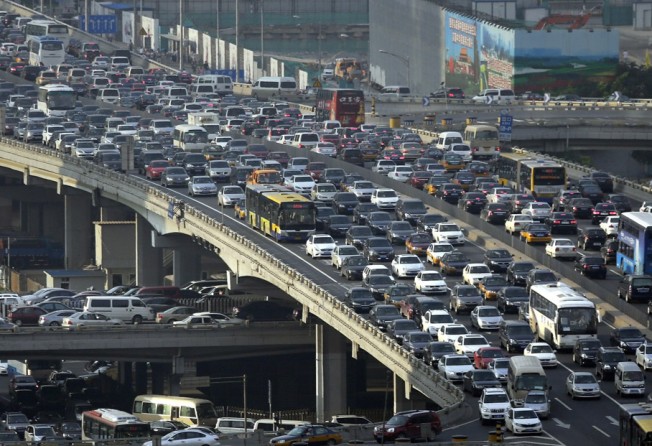Drivers in spin over Beijing congestion charge

A Beijing city government proposal to impose a traffic congestion charge has met fierce resistance from drivers.
Rong Jun, a delegate with Beijing Municipal Commission of Transport, told China News Services on Tuesday that the government was considering the charge as part of a plan to ease traffic congestion and improve air quality in the city.
The success of congestion charging zones in London and Singapore had inspired Beijing, he said. London, for instance, saw its downtown traffic speed triple to 30km/h after it introduced its congestion charge. Drivers pay £10 (HK$122) a day to drive in the city centre between 7am and 6pm on weekdays.
Beijing's traffic authorities believed the measure would also provide some relief to Beijing's notoriously clogged roads, where peak hour traffic has dropped to 20km/h in recent months.
But news of the charge was roundly condemned by drivers. Opinions posted on weibo accounts were almost one-sidedly negative, with some accusing the government of being "lazy", "brutal" and "greedy".
Nie Sheng, a resident of Daxing who drives to work in Haidian, said a congestion charge would not solve Beijing's traffic jams, judging by past experience.
"In recent years, the government has restricted sales of cars, raised parking fees in the city centre and banned non-local vehicles from the city, but the traffic has only got worse," he said.
Nie also worried that the charge would penalise low income and middle class drivers while sparing the rich and powerful, who could either afford the charge or used government cars.
Even within the government, opposition was strong.
An official of the Development and Reform Commission at Xicheng district government feared the charge would hurt the economy.
"The service sector could be hurt dearly. People will think twice about visiting to shopping malls and restaurants in the city," said the official, who did not want to be named.
"Who will collect the charge? Who will pay for the business losses? Negotiations between different government agencies will be tough. I don't think the charge will be introduced for at least two years, if at all."
But Chen Xumei, a professor of urban traffic management at Beijing Jiaotong University, said she supported congestion charging zones.
"The pollution caused by vehicles has become so bad, it will soon break the back of the city," she said.
"Every car driver is responsible for the pm2.5 in Beijing," she said, referring to superfine particulates that are regarded as the most dangerous form of smog. "They must either pay for their life on wheels, or take public transport."
But Chen admitted that the city's existing public transport such as buses and subways, still lagged far behind London and Singapore.
"Most people drive because they feel no dignity on public transport, which is inconvenient, congested, uncomfortable and dirty," she said. "The money collected from the congestion charge should be used to improve public transport."